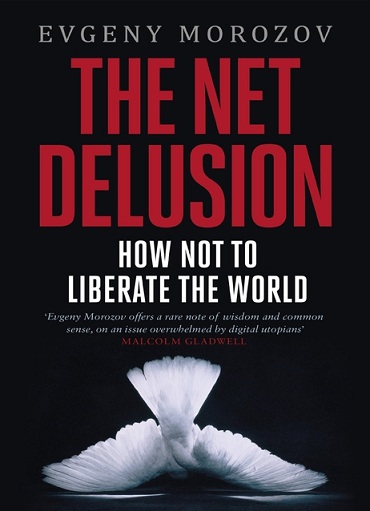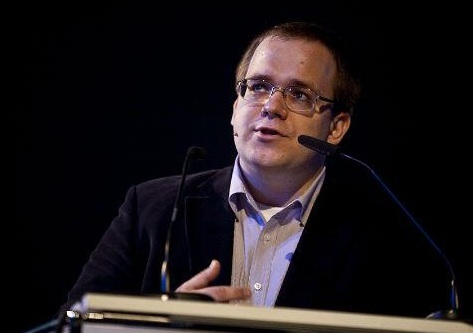A damning, intelligent, and entertaining indictment of cyber-utopianism and Internet-centrism.
The Internet was supposed to free the world, wasn’t it? All that is needed to topple an oppressive regime is Twitter, Facebook, and a smartphone in every hand. Or so we heard.
Malcolm Gladwell famously started the backlash against the cyber-utopians, quipping that “the revolution will not be tweeted”. The detractors weren’t arguing that the Internet was a negative thing — perhaps Twitter and Facebook couldn’t spark revolutions, but there’s no harm in being in touch with the fact that your friends (or random folk) are stuck in traffic or having some awesome nasi lemak.
But now it seems the pendulum has swung in other direction — continued delusion and exaggeration of the Internet’s role in freeing the captives could blind us to the fact that it may in some, perhaps many, cases be used to suppress dissidents and strengthen authoritarian regimes. It is this interesting approach that makes Evgeny Morozov’s “The Net Delusion” essential reading (available from Kinokuniya).

Morozov states that the book’s premise is simple: “To salvage the Internet’s promise to aid the fight against authoritarianism, those of us in the West who still care about the future of democracy will need to ditch both cyber-utopianism and Internet-centrism.” The combination of cyber-utopianism (flawed assumptions) and Internet-centrism (flawed methodology) is what Morozov calls “the Net Delusion”.
His description of cyber-utopianism is that it is “a naïve belief in the emancipatory nature of online communication that rests on a stubborn refusal to acknowledge its downside”.
The problem with Internet-centrism is it “prioritises the tool over the environment, and, as such, is deaf to the social, cultural, and political subtleties and indeterminacies. [It] is a highly disorienting drug [that] leads to hubris, arrogance, and a false sense of confidence […]”
Morozov says the West must “opt for policies informed by a realistic assessment of the risks and dangers posed by the Internet, matched by a highly scrupulous and unbiased assessment of its promises, and a theory of action that is highly sensitive to the local context, that is cognizant of the complex connections between the Internet and the rest of foreign policymaking, and that originates not in what technology allows but in what a certain geopolitical environment requires.”
To make his point, Morozov takes the reader on a well-researched (the bibliography spans 69 pages) journey that is expansive, but never superfluous.

He starts off, of course, with the 2009 “Twitter revolutions” of Moldova and Iran, when the concept of Twitter (and other social media) powering revolutions started to appear in the columns of mainstream journalists, not just technology evangelists. Morozov warns of the “quasi-religious belief in the power of the Internet to do supernatural things”. There’s nothing wrong with heralding the role that social media played in mobilizing people, or at the very least spreading information in a more effective manner, but the danger in over-exuberance is that it hides the fact (which Morozov explains in convincing detail) that the Web can actually strengthen, rather than undermine, authoritarian regimes.
There is lots of interesting historical context here, as Morozov draws parallels in particular with the role of samizdat in bringing down the Iron Curtain — which has by now obviously experienced the embellishments that come with nostalgia and revisionism. And the Internet is obviously not the first technology to be hailed a world-changing, from the telegraph, airplane, radio, and the television, “there has hardly appeared a technology that wasn’t praised for its ability to raise the level of public debate, introduce more transparency into politics, reduce nationalism, and transport us to the mythical global village”.
His descriptions of how modern-day Russia is handling Internet freedom are also very illuminating (“The most effective system of Internet control is not the one that has the most sophisticated and draconian system of censorship, but the one that has no need for censorship whatsoever”). It is scary to realise that the Internet — Google, Amazon, and Facebook included — may actually be assisting oppressive regimes to silence dissenting voices, keep close track of activists and their friends, and distract citizens into unwitting submission. And Malaysian readers will find some uncomfortable similarities between their Internet experience and what Morozov terms “the Spinternet”.
But the object of the book is not to mock the naivety of those who equate Twitter and Internet freedom with democracy and liberation. Rather, Morozov is providing a much-needed reality check. Many have tried to communicate a similar message, but not many have done so quite as elegantly and convincingly as Morozov has done here.
As the reality slowly emerges that authoritarian regimes are much more subtle than the Big Brother of Orwell’s Nineteen Eighty-Four — resembling more and more Huxley’s Brave New World instead — it is definitely worthwhile being reminded that breaking down firewalls isn’t the solve-all-problems achievement that it is. As Morozov puts it:
“That there are many more voices online may be important, but what really matters is whether those voices eventually lead to any more political participation and, eventually, any more votes. (And even if they do, not all such votes are equally meaningful, for many elections are rigged before they even start.)”
and
“What is, therefore, most dangerous about succumbing to technological determinism is that it hinders our awareness of the social and the political, presenting it as the technological instead.”
I will leave you with a few excerpts from the book — some of which may sound very close to home for Malaysians — which will hopefully convince you that it must be purchased and read in its entirety (though the fact that there are chapters titled “Orwell’s Favourite Lolcat” and “Why Kierkegaard Hates Slactivism” should really be reason enough!):
- Debates over “civil society” have immense repercussions for the future of Internet freedom policy, in part because this fuzzy concept is often endowed with revolutionary potential and bloggers are presumed to be its vanguard.
- It seems somewhat naïve to believe that strong authoritarian governments will balk at cracking down on protestors for fear of being accused of being too brutal, even if their every action is captured on camera; most likely, they will simply learn how to live with those accusations.
- Popular culture, especially when left unchecked by appeals to some higher truth or ideal, has eroded the political commitment of even the most dissatisfied citizens.
- Even authoritarian governments have discovered that the best way to marginalize dissident books and ideas is not to ban them – this seems only to boost interest in the forbidden fruit – but to let the invisible hand flood the market with trashy popular detective stories, self-help manuals, and books on how to get your kids into Harvard.
- It seems highly naïve to assume that political ideals — let alone dissent — will somehow emerge from this great hodgepodge of consumerism, entertainment, and sex.
- Those of us concerned about the future of democracy around the globe must stop dreaming and face reality: The Internet has provided so many cheap and easily available entertainment fixes to those living under authoritarianism that it has become considerably harder to get people to care about politics at all.
- Citizens of authoritarian states do not necessarily perceive their undemocratically installed governments to be illegitimate, for legitimacy can be derived from things other than elections; jingoist nationalism (China), fear of a foreign invasion (Iran), fast rates of economic development (Russia), low corruption (Belarus), and efficiency of government services (Singapore) have all been successfully co-opted for these purposes.
- Governments have learned that they can still manipulate online conversations by slightly adjusting how they manufacture and package their propaganda, with some of their older and otherwise stale messages finding new life and appealing to new audiences.
- Authoritarian governments are busy turning the Internet into the Spinternet — a Web with little censorship but lots of spin and propaganda — which reinforces their ideological supremacy.
- Governments, both authoritarian and democratic, [have created] their own cyber-brigades of loyal Internet commentators […] setting up their own blogs, leaving critical comments on antigovernment blogs, and reprinting the best pro-government blog posts in the official media.
- Today, most people in authoritarian countries are operating in a media environment where there is some truth and there is some news, but the exact balance is unclear, and misjudgments are inevitable.
- While Facebook-based mobilization will occasionally lead to genuine social and political change, this is mostly accidental, a statistical certainty rather than a genuine achievement.
- The problem with political activism facilitated by social networking sites is that much of it happens for reasons that have nothing to do with one’s commitment to ideas and politics in general, but rather to impress one’s friends.
- No angry tweets or text messages, no matter how eloquent, have been able to rekindle the democratic spirit of the masses, who, to a large extent, have drowned in a bottomless reservoir of spin and hedonism, created by a government that has read its Huxley.
- Governments, of course, are not stupid. They are also taking advantage of this tremendous new opportunity to cover their own attempts to influence global public opinion in the cloth of vox populi, either directly or through the work of proxies.
- It’s even more difficult to judge whether the segments that we happen to see are representative of the entire population. It’s never been easier to mistake a few extremely unrepresentative parts for the whole.
- Determinism — whether of the social variety, positing the end of history, or of the political variety, positing the end of authoritarianism — is an intellectually impoverished, lazy way to study the past, understand the present, and predict the future.
Related links:
- Is Twitter Useless at Social Activism? (Part 1)(LoyarBorak, 4 November 2010).
- Is Twitter Useless at Social Activism? (Part 2)(LoyarBorak, 5 November 2010).
- Social Media Fail (Annah Kim, 30 January 2012).
- Breeding a New Generation of Activists (Edmund Bon, 14 July 2012).


When I initially commented I clicked the “Notify me when new comments are added” checkbox
and now each time a comment is added I get four emails with the same comment.
Is there any way you can remove people from that service? Cheers!